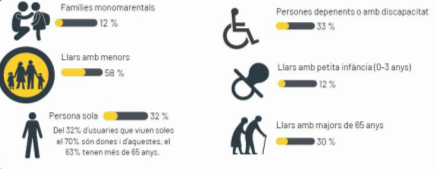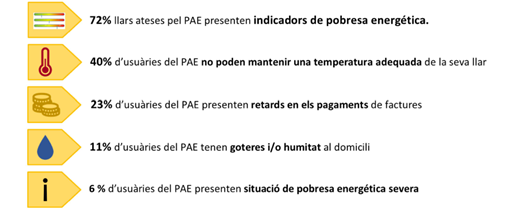`);
finestraImpressio.document.close();
// Esperem que es carregui el contingut i fem la impressió
finestraImpressio.onload = function()
finestraImpressio.focus();
finestraImpressio.print();
finestraImpressio.close();
;
});
Estimated reading time: 5 minutes
- The 13 Energy Advice Points (PAE) consolidate their social and environmental work with a high degree of citizen satisfaction and a direct impact on the defense of energy rights and the reduction of expenses in households
- Since 2017, the service has prevented 196,013 cuts in basic service supply to households and has managed over 237,000 consultations
- In 2024, the service’s attendance figures have been the highest since its inception, with a monthly average of over 3,000 people
The Energy Advice Points (PAE) are established as an essential service of the City Council to guarantee the energy rights of citizens, especially those in vulnerable situations. Since its creation in 2017, the service has prevented 196,013 cuts in basic service supply to households and has managed over 237,000 consultations.
With 13 service points distributed in all districts, a total of 37,088 people were served in 2024, reaching 15,320 households, the highest figure since the service was launched.
Any citizen can go there to learn about their energy rights, receive personalized advice, and reduce possible overcharges on their electricity, water, and gas bills. Those who have been served give it a rating of 9.7, and 98% would recommend the service. This pioneering resource at the city level has become a reference in the fight against this type of poverty and is essential to ensure the application of Law 24/2015 on urgent measures to address the emergency in the housing and energy poverty sector.
The Commissioner for Social Action, Sonia Fuertes, emphasized that “in a context of climate emergency, the PAEs have become an essential tool to detect and reduce energy poverty in our city. It is evident that the climate crisis does not affect everyone equally and that its consequences are deeply linked to issues of human rights, social, economic, and environmental inequality.”
In the work carried out by the professionals of the PAE in support and advice, one of the objectives is to detect situations of energy poverty and intervene in the homes of vulnerable families to guarantee the rights provided for in current legislation regarding access to basic supplies and the protection against possible cuts.
Some indicators of the procedures carried out from the Energy Advice Points throughout 2024 to protect vulnerable citizens and optimize their energy consumption:
- 841 protected supplies with a residential exclusion risk report in application of Law 24/2015. The residential exclusion risk report (IRER) is the document that protects vulnerable people from possible cuts by suppliers in situations of non-payment.
- The electricity and gas social discount has been processed for 58% of the people served, a total of 852 social vouchers for vulnerable households that were not benefiting from them despite meeting the requirements.
- Savings of €33,000 from power reductions, this is a very effective tool to reduce the fixed cost of the electricity bill in households that have approached the PAE. The accumulated savings since 2017 amount to almost €600,000.
- Regarding water supply, the main procedures carried out have been the application for the social rate, which allows water to be subsidized in 58% of cases, the discount on the bill issued by meter maintenance companies in 34% of cases, and the change of ownership in 9% of cases.
- 646 supply regularizations for people without a contract.
- 686 service restorations in households that had experienced non-payment, with an urgent and efficient response for service restoration.
The PAEs also work to improve the energy efficiency of households and provide answers to all those who want to contribute to environmental sustainability by learning about their energy consumption and how to reduce it.
40% of the people served cannot maintain a comfortable temperature at home
Housing, energy prices, and household income are three key factors that impact energy poverty.
In 72% of the more than 15,000 households served in 2024, indicators of energy poverty have been detected, and 6% are in severe energy poverty, which occurs when all indicators converge: delayed payment of a supply, humidity and/or mold, and inability to maintain a comfortable temperature. 40% say they cannot maintain a suitable temperature at home.
Profile of users

96% of the people served in 2024 at the PAE are in a situation of social vulnerability. It is a predominantly female profile, with a low level of education and children in their care, or over 65 years old with situations of loneliness.
The peaks of attention demand mainly in the months of February, July, and October. There is a greater presence of the phenomenon of summer energy poverty. During July, PAE users requested advice to cope with the hottest months and information on the locations of the Climate Refuge Network in the Districts.
One of the consequences of energy poverty is health problems. Living in a home with excessively high or low temperatures for an extended period, or with humidity and mold, facilitates the development of diseases such as asthma, arthritis, depression, or anxiety, among others. These diseases have a greater impact on children or the elderly.

13 points of in-person attention
The Energy Advice Points of Barcelona have 13 points of in-person attention. Most of them are integrated into Municipal Services facilities, such as Social Services centers, Housing Offices, or Comprehensive Care Centers. There are also offices located in Civic Centers or Neighborhood Centers (Mas Guinardó, Carmel Neighborhood Center, or La Farinera Civic Center).
Direct impact on emissions reduction
In addition to the positive social impact, there is also a saving of 1.8 million kWh of electricity consumption in the assisted households, and 511.8 tons of CO₂ emissions have been avoided in the atmosphere.

